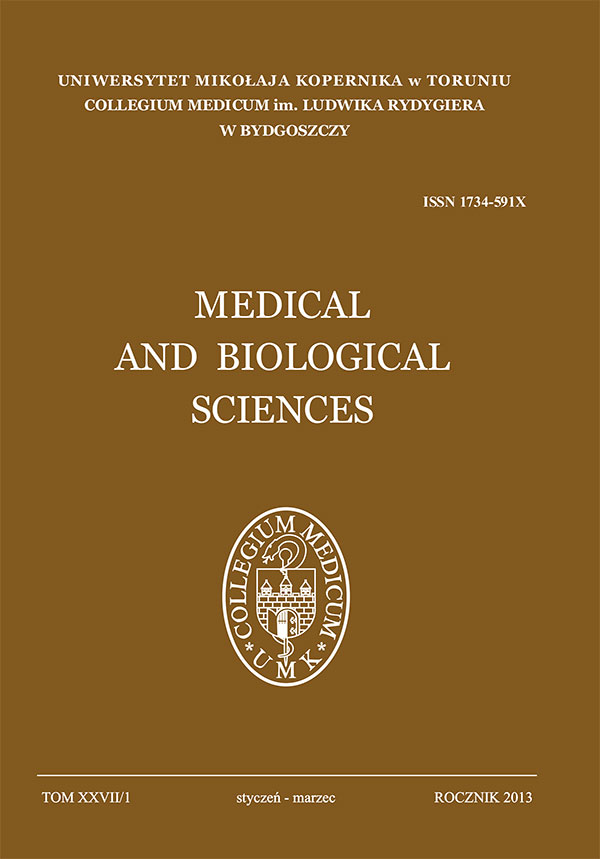Stres Oksydoredukcyjny a Alkoholowa Choroba Wątroby
DOI:
https://doi.org/10.12775/mbs-2013-0002Słowa kluczowe
alkohol, stres oksydoredukcyjny, reaktywne formy tlenu (RFT), alkoholowa choroba wątrobyAbstrakt
Ze względu na łatwą dostępność i relatywnie niską cenę, alkohol jest obecnie najpowszechniej stosowanym środkiem odurzającym. Spożywanie nadmiernych ilości alkoholu wiąże się z wieloma konsekwencjami zdrowotnymi, do których należy powstawanie w wątrobie patologicznych zmian prowadzących do rozwoju alkoholowej choroby wątroby. Za powstawanie tych zmian odpowiedzialne są m.in. zaburzenia metaboliczne, reakcje immunologiczne i powstawanie cytokin, a także hipoksja hepatocytów okołożylnej strefy płacikowej oraz stres oksydoredukyjny. Poniższa praca ma na celu omówienie mechanizmu powstawania w organizmie stresu oksydo-redukcyjnego związanego z długotrwałym nadużywaniem alkoholu. Poznanie i zrozumienie mechanizmów leżących u podstaw tego zjawiska może pozwolić na przeciwdziałanie negatywnym skutkom konsumpcji alkoholu zanim pojawią się poważne uszkodzenia wątroby wywołane jego toksycznym oddziaływaniem.Bibliografia
World Health Organization: WHO Expert Committee on problems related to alcohol consumption, Genewa 2007.
Reuben A.: Alcohol and the liver. Curr. Opin. Gastroenterol., 2006; 22: 263-271.
Lieber, C.S.: Metabolism of Alcohol. Clin. Liver Dis., 2005; 9:1 - 35.[ http://dx.doi.org/10.1016/j.cld.2004.10.005]
Cichoż-Lach H., Grzyb M., Celiński K.: Nadużywanie alkoholu a alkoholowa choroba wątroby. Alkohol. Narkom., 2008; 21, 1: 55-62.
Bruha R., Dvorak K., Petrtyl J.: Alcoholic liver disease. World J. Hepatol., 2012; 4, 3: 81-90.
Koop D.: Alcohol metabolism's demaging effects on the cell. A focus on reactive oxygen generation by the enzyme cytochrome P450 2E1. Alcohol Res. Health, 2006; 29, 4: 274-280.
Zakhari S.: Overview: How is alcohol metabolized by the body? Alcohol Res. Health, 2006; 29, 4: 245-254.
Lieber C.S. Relationships between nutrition, alcohol use and liver disease. Alcohol Res. Health, 2003; 27, 3: 220-231.
Lieber C.S., DeCarli L.: Hepatic microsomal ethanoloxidizing system. J. Hepatol., 2004; 40: 198-202.
Czech E., Lewin-Kowalik J., Hartleb M.: Udział katalazy w mózgowym i pozamózgowym utlenianiu etanolu. Alkohol. Narkom., 2006; 19, 2: 169-182.
Jelski W., Grochowska-Skiba B., Szmitkowski M.: Dehydrogenaza alkoholowa i metabolizm alkoholu etylowego w mózgu. Post. Hig., 2007; 61: 226-230.
Jelski W., Chrostek L., Szmitkowski M.: Biochemiczne podstawy alkoholowego uszkodzenia wątroby. Pol. Merkuriusz Lek., 2006; 21, 124: 376-380.
Hirano T.: Alcohol consumption and oxidative DNA damage. Int. J. Environ. Res. Public Health., 2011; 8: 2895-2906. [http://dx.doi.org/10.3390/ijerph8072895]
Beerling D.J., Berner R.A.: Impact of a permocarboniferous high O2 event on the terrestrial carbon cycle. Proc. Natl. Acad. Sci. U S A, 2000; 97: 12428-12432.[ http://dx.doi.org/10.1073/pnas.220280097]
Wu D., Cederbaum A.: Alcohol, oxidative stress, and free radical damage. Alcohol Res. Health, 2003; 27, 4: 277-284.
Hartleb M., Czech E.: Alkoholowa choroba wątroby. Prz. Gastroenterol., 2007; 2, 2: 92-100.
Albano E.: Oxidative mechanisms in the pathogenesis of alcoholic liver disease. Mol. Aspects Med. 2008; 29: 9-16. [http://dx.doi.org/10.1016/j.mam.2007.09.004]
Valko M., Leibfritz D., Moncol J. et al.: Free radicals and antioxidants in normal physiological functions and human disease. Int. J. Biochem. Cell Biol., 2007; 39: 44-84. [http://dx.doi.org/10.1016/j.biocel.2006.07.001]
Toyokuni S. Reactive oxygen species-induced molecular damage and its application in pathology. Pathol. Int., 1999; 49: 91-102. [http://dx.doi.org/10.1046/j.1440-1827.1999.00829.x]
Liochev S.I., Fridovich I.: The Haber-Weiss cycle - 70 years later: an alternative view, Redox Rep., 2002; 7: 55-57. [http://dx.doi.org/10.1179/135100002125000190]
Leonard S.S., Harris G.K., Shi X.L.: Metal-induced oxidative stress and signal transduction, Free Radic. Biol. Med., 2004; 37, 1921-1942.
French S.W., Morimoto M., Reitz R.C.: Lipid peroxidation, CYP2E1 and arachidonic acid metabolism in alcoholic liver disease in rats. J. Nutr., 1997; 127: 907S-911S.
Berry C.E., Hare J.M.: Xanthine oxidoreductase and cardiovascular disease: molecular mechanism and pathophysiologucal. J. Physiol. (Lond), 2004; 555, 3: 589-606.
Cederbaum A.I., Lu Y., Wu D.: Role of oxidative stress in alcohol-induced liver injury. Arch. Toxicol., 2009; 83, 6: 519-548. [http://dx.doi.org/10.1007/s00204-009-0432-0]
Gunzerath L., Hewitt B.G., Li T.K. et al.: Alcohol research: past, present, and future. Ann. N Y Acad. Sci., 2011; 1216, 6648: 1-23.
Mann R.E., Smart G.R., Govoni R.: The epidemiology of alcoholic liver disease. Alcohol Res. Health, 2003; 27, 3: 209-219.
Kopczyńska E., Torliński L., Ziółkowski M: Wpływ uzależnienia od alkoholu na parametry stresu oksydacyjnego. Post. Hig., 2001; 55, 1: 95-111.
Kolios G., Valatas V., Kouroumalis E.: Role of Kupffer cells in the pathogenesis of liver disease. World J. Gastroenterol., 2006; 14, 12, 46: 7413-7420.
Schuckit M.A., Smith T.L.: The clinical course of alcohol dependence associated with a low level of response to alcohol. Addiction, 2001; 96: 903-910.[ http://dx.doi.org/10.1046/j.1360-0443.2001.96690311.x]
Weatherman R., Crabb D.W.: Alcohol and medication interactions. Alcohol Res. Health, 1999; 23: 40-54.
Pobrania
Opublikowane
Jak cytować
Numer
Dział
Statystyki
Liczba wyświetleń i pobrań: 535
Liczba cytowań: 0



